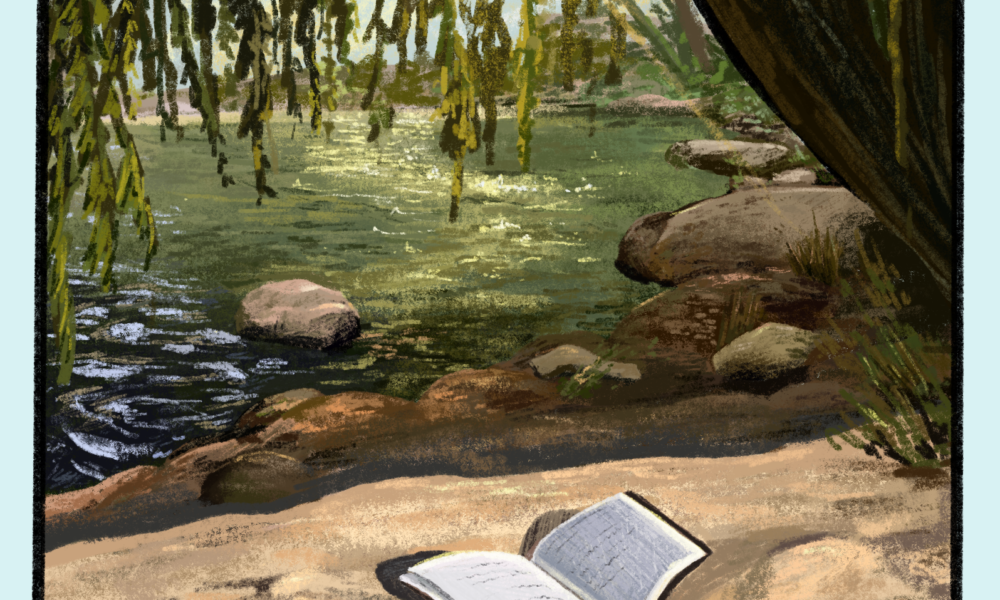Soft gusts of breeze billow through loose hair as the sun reflects off bleached book pages. There is a prodding sharpness of salty seas and a deep odour of oak groves. A blow of wheat and pollen caresses overgrown fields; wind fights the fluttering pages of a book.
The beginning of summer often marks a return to reading for joy, without the impending doom that seeps into the pages of my literature assignments. Easing back into the comfort of real life, I rekindled my love of reading. But a real tragedy befell me: Glancing at the piles of books that awaited my return home, I felt stunted, overwhelmed by the number of options that lay before me.
The question of what books are perfectly suited to the airiness of summer’s lingering months plagues both the internet and my mind. To fill the long-winded days with narratives unlike my own would be the ideal outcome, but wherever I started seemed to be the wrong path. After searching for my perfect summer read in a drug and sex-ridden memoir of New York’s 70s punk scene, a historical fiction book about misogynistic witchcraft accusations, and whatever Miranda July considers the plot of her new novel, I finally found my answer in Ben Shattuck’s short fiction.
A book most suited for summer isn’t just something light—a work requiring no thought in the process of reading—but rather one that bathes in the quaint beauty of its seeming nothingness. Its atmosphere is earnest and reflective. These contemplative, character-driven books hold a mirror to the surrounding world, picking out its complexities and documenting the nuances of human experience.
In the windy greenery of Vermont hills, I perched with Shattuck’s short story collection, The History of Sound, only glancing up at howling birds or the whispering of dirt roads. It is one of the finest collections of short stories that I have ever had the delight to read. Set amidst the backdrop of New England, the collection explores the interactions of people in the region throughout time.
Thoughtful and intense, each anecdote flows in like a budding wave, crashing and easing into the shore, slowly drifting back out with a turn of the page. “The Auk” follows a man’s quest to comfort the idle days of his wife with Alzheimer’s, while “Edwin Chase of Nantucket” sees a meeting between old lovers—a painter and his first love, Laurel—told from the perspective of her young son. The eponymous story, the first of the collection, details two men’s budding romance en route to tape folk songs of the American Northeast, and the eventual fallout of their forbidden love in the early 19th century. Shattuck rounds out the collection with “Origin Stories,” a return to the men’s narrative almost fifty years later, wherein a woman discovers these recordings and seeks to return them to their rightful owner.
In these quiet reflections of temporal transience, Shattuck’s narrative demonstrates how history scars the present with evidence of its past. His stories come in pairs, as if rhyming couplets in a poem. Often shifting from past to present—or vice versa—in the complementary stories, these odes to humanity serve to remind us that although history feels distant, it remains alive in everything around us.
Shattuck captures a moment in time as if a storied set of narrative paintings, waiting to be made sense of alongside its companions. Though we pass through each world only momentarily, we witness the charms and weaknesses of those encountered with breathtaking nuance.
I left his work with a profound sense of gratitude, recognizing the menialities and quaintness of life through which we are all connected. We all have felt the anxiety of making new conversations, the internal ache of a love unrequited, the panging uncertainty of decision. We are all simply waves crashing against stone, combusting and receding, making way for waves soon to follow. It is ultimately in these quiet ruminations that summer is most suited.









